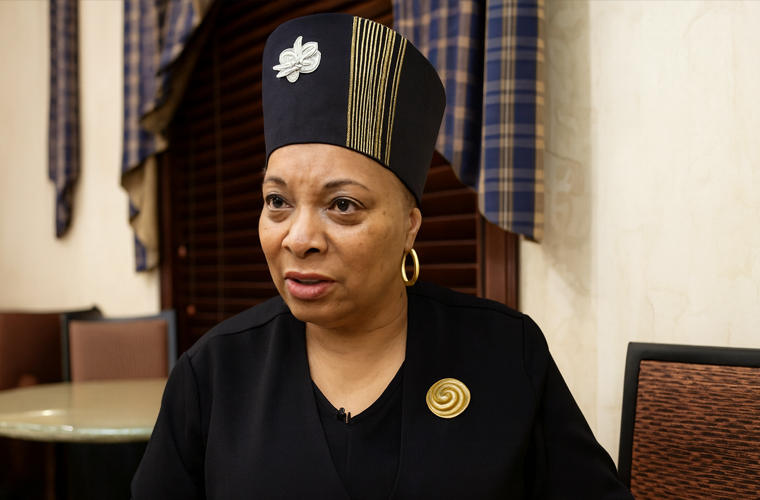A Controversial Voice in African American Discourse
Shahrazad Ali, born on April 27, 1954, in Atlanta, Georgia, is an African American author, social commentator, and public speaker whose provocative perspectives have sparked intense debate. Raised in Cincinnati, Ohio, Ali grew up in a time of significant social and political change, including the Civil Rights Movement and the rise of Black Power ideologies. These formative years shaped her worldview, which blends cultural nationalism, traditionalism, and a focus on African American family dynamics. While little is publicly documented about her early education or personal life, her work reflects a deep engagement with the challenges facing African American communities.
Rise to Prominence: The Blackman’s Guide to Understanding the Blackwoman
Ali gained national attention with the publication of her seminal work, The Blackman’s Guide to Understanding the Blackwoman, in 1989. The book, independently published, became a lightning rod for controversy due to its bold assertions about gender roles within African American households. Ali argued that African American men should assume leadership roles as the natural heads of their families, while women should adopt a supportive, submissive posture. She posited that such dynamics would restore balance and strengthen Black families, which she viewed as under siege from systemic racism and internal dysfunction.
The book’s unapologetic tone and prescriptive advice divided readers. Supporters, particularly those drawn to traditionalist or Afrocentric ideologies, praised Ali for addressing taboo topics and advocating for what they saw as a return to cultural values rooted in African heritage. Critics, however, including many feminists and progressive scholars, condemned the book as reinforcing patriarchal norms and oversimplifying complex social issues. Some accused Ali of promoting misogyny, particularly due to passages that appeared to justify or excuse domestic discipline, which sparked heated debates on talk shows and in community forums. Despite the polarized reception, the book’s impact was undeniable. It sold thousands of copies, largely through grassroots distribution in African American bookstores and community centers, and established Ali as a polarizing figure in Black intellectual and cultural circles.
Other Works and Contributions
Beyond The Blackman’s Guide, Ali has authored several other books, including The Blackwoman’s Guide to Understanding the Blackman (1992) and Are You Still a Slave? (1994). These works continue her exploration of gender dynamics, self-reliance, and cultural identity within African American communities. Her writing often challenges mainstream narratives, urging Black individuals to reject assimilationist ideals and embrace self-determination. While none of her subsequent works matched the commercial success of her debut, they solidified her reputation as a provocative thinker unafraid to confront sensitive topics.
In addition to her writing, Ali is an accomplished public speaker. She has delivered lectures across the United States on topics ranging from family dynamics and gender roles to education, politics, and race relations. Her appearances on television programs, including The Oprah Winfrey Show, The Phil Donahue Show, and various news segments, amplified her reach in the 1990s. These platforms allowed her to articulate her views to broader audiences, though they also exposed her to intense scrutiny and criticism from moderators and viewers alike.
Public Reception and Legacy
Ali’s work has elicited a spectrum of reactions. Supporters view her as a courageous voice who challenges politically correct norms and addresses uncomfortable truths about gender and family dynamics in African American communities. They argue that her emphasis on traditional roles offers a counterpoint to the perceived erosion of family structures due to systemic pressures like poverty, incarceration, and discrimination. Her Afrocentric perspective, which draws on African cultural traditions, resonates with those who advocate for cultural reclamation and self-sufficiency.
Conversely, critics argue that Ali’s views perpetuate harmful stereotypes and undermine efforts toward gender equality. Feminist scholars and activists, in particular, have challenged her portrayal of women’s roles as submissive, arguing that it dismisses the agency and diversity of Black women’s experiences. Some have also criticized her for focusing on individual behavior rather than systemic factors like economic inequality or institutional racism, which they see as more pressing barriers to Black family stability.
Despite the controversy, Ali’s influence persists. Her books remain in circulation, particularly in niche markets, and her ideas continue to spark discussion in academic, cultural, and online spaces. She has been referenced in debates about gender roles, Black nationalism, and the intersection of race and family dynamics. While her prominence has waned since the 1990s, her work is still studied by those interested in African American cultural history and gender studies.
Personal Philosophy and Broader Impact
Ali’s philosophy is rooted in a blend of cultural nationalism, traditionalism, and a critique of Western societal norms. She often frames her arguments within an Afrocentric lens, emphasizing the need for African Americans to reclaim cultural practices that predate colonialism and slavery. Her work also reflects a deep skepticism of mainstream institutions, including education and media, which she believes perpetuate negative stereotypes about Black people.
In recent years, Ali has maintained a lower public profile but continues to engage with audiences through independent media and occasional speaking engagements. Her ideas have found a new audience in online spaces, where debates about gender roles and Black family dynamics remain contentious. While some view her as a relic of an earlier era, others see her as a prescient figure whose critiques of societal trends remain relevant.
Shahrazad Ali occupies a unique and controversial space in African American intellectual and cultural history. Her work, particularly The Blackman’s Guide to Understanding the Blackwoman, challenged conventional wisdom and ignited debates that continue to resonate. Whether celebrated as a bold truth-teller or criticized as a proponent of outdated ideologies, Ali’s contributions have left an indelible mark on discussions of race, gender, and family in America. Her legacy serves as a reminder of the complexities and passions that define African American discourse.

